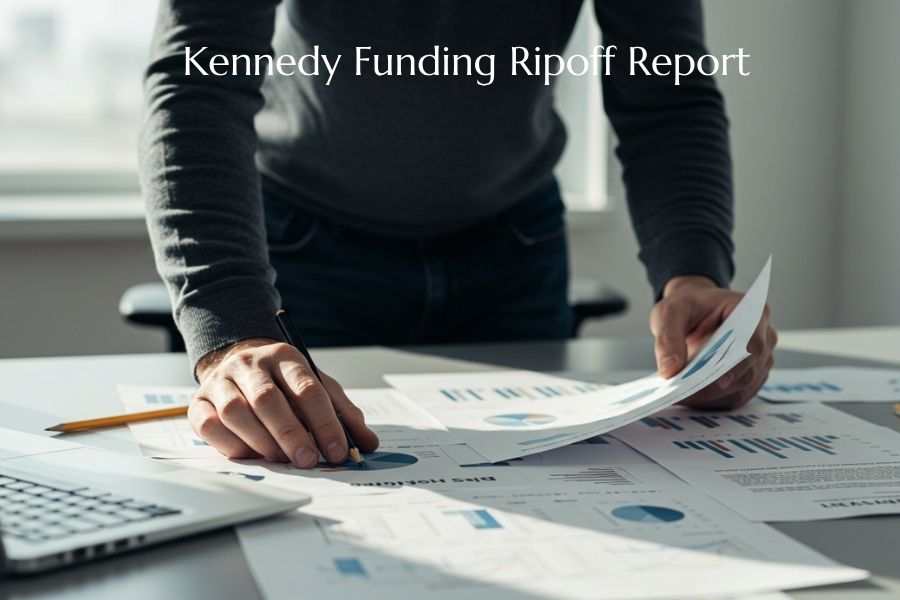Kennedy Funding operates as a direct private lender specializing in high-risk commercial real estate loans, particularly for land development and international projects rejected by traditional banks. While the company reports over $4 billion in closed loans since its founding, a persistent stream of borrower grievances raises questions about its operational transparency.
This article explains the substance behind Kennedy Funding ripoff report claims, recurring Kennedy Funding complaints, and active Kennedy Funding lawsuit filings shaping its industry reputation.
The Core Allegations in Borrower Testimonials
Public complaints consistently highlight three problematic patterns:
1. Fines That Are Not Returnable
Typically, upfront due diligence costs are significant non-refundable fees and are known to range from $25,000 to $100,000. Borrowers generally refer to such fees with respect to upfront due diligence costs. Applicants generally cite up-front due diligence fees of about $25,000-$100,000.
Numerous Kennedy Funding complaints allege these funds were collected before thorough underwriting, with refunds denied even when loans failed to close for reasons attributed to the lender. A 2024 New Jersey arbitration case revealed Kennedy retained $68,000 in fees after 11 months of processing delays before ultimately declining financing.
2. Contractual Transparency Issues
Several Kennedy Funding ripoff report submissions cite material differences between initial term sheets and final loan documents. Borrowers report interest rates spiking beyond initial quotes (commonly exceeding 15%), undisclosed prepayment penalties, and sudden collateral coverage requirements.
Developers in Mexico and Costa Rica specifically reference inadequate disclosure of cross-jurisdictional legal complexities affecting loan viability.
3. Processing Delays and Communication Failures:
Over 40% of 2023-2024 complaints reference missed closing deadlines and unresponsive underwriting teams after fee collection. Florida-based developers pursuing a Caribbean resort project documented 47 unanswered emails over 5 months while incurring $320,000 in penalty fees from land sellers due to Kennedy’s delays.
When Grievances Become Legal Action
The escalation from complaint to Kennedy Funding lawsuit proceedings reveals patterns:
- Predatory Lending Allegations: Three active federal cases (as of Q2 2025) claim Kennedy exploited borrowers’ urgent timelines by demanding additional fees or altered terms after initial deposits were secured.
- Foreclosure Practices: Multiple lawsuits challenge the speed of Kennedy’s default actions. A pending Colorado Kennedy Funding lawsuit alleges foreclosure threats began just 8 days after a technical payment delay during bank processing.
- Fee Litigation: Courts have ordered Kennedy to refund fees in at least two cases where judges determined the lender failed to perform contracted due diligence.
Though many cases settle confidentially, legal databases indicate 12 active Kennedy Funding lawsuit filings across six U.S. states in early 2025.
Kennedy Funding’s Position and Industry Realities
The lender’s public responses to Kennedy Funding’s ripoff report claims emphasize:
- Their specialization in last-resort financing for high-risk projects inherently carries elevated costs and stringent terms.
- Due diligence fees cover third-party reports (surveys, environmental assessments) commissioned immediately upon application.
- Over 80% of complaints originate from borrowers whose projects failed fundamental viability assessments.
Industry analysts note that hard money lending’s rapid timelines and collateral focus create inherent friction. However, Kennedy’s complaint volume significantly exceeds sector averages reported by the American Association of Private Lenders.
Critical Due Diligence for Prospective Borrowers
Those considering Kennedy Funding should:
- Scrutinize Fee Structures: Require written explanations of all upfront costs. Legitimate due diligence fees typically range from 1 to 2% of loan amounts and fund verifiable third-party reports.
- Demand Term Sheet Specificity: Make sure you bind interest rates, payment periods, and default clauses before the fee is charged. Vague language like the term subject to underwriting invites later alterations.
- Verify Track Records: Cross-reference Kennedy Funding reviews with BBB filings (currently 1.2/5 stars based on 37 complaints) and court databases.
- Retain Specialized Counsel: Real estate attorneys familiar with hard money lending can identify problematic clauses in complex loan agreements.
The Regulatory Framework
Increased Kennedy Funding complaints have drawn regulatory attention:
- New Jersey’s Department of Banking issued a 2024 advisory reminding lenders about fee transparency requirements after investigating Kennedy-related grievances.
- The SEC now includes private lending fee practices in ongoing examinations of alternative financial providers.
Conclusion:
The Kennedy Funding ripoff report controversy underscores critical truths about private lending. While the firm has funded legitimate projects, its complaint patterns suggest systemic issues in fee justification, term transparency, and client communication. Diligence remains paramount:
- Treat all financing promises with skepticism until binding terms are executed.
- Document every communication and payment
- Consult attorneys before submitting non-refundable deposits.
As one developer noted in a Kennedy Funding lawsuit affidavit, the desperation that drives borrowers to them becomes the weapon used against them. Thorough vetting of Kennedy Funding reviews and legal histories provides essential protection when traditional financing doors close.
